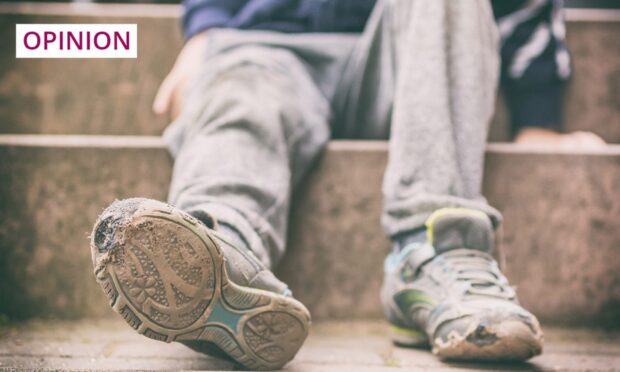My explorations of the history of the Scottish north have often led to my encountering accounts of people living in the grimmest of grim circumstances.
Among the many sources of such accounts is the 1844 report of a government-appointed commission, tasked with looking into what could be done to deal with poverty.
The report’s pages are replete with horrors. In the Skye community of Colbost, the furnishings available to a family by the name of MacLeod consist of “one bedstead with straw and very poor bedding”. Two of the family’s four children are so lacking in clothes as to be “nearly naked”. Their bedstead apart, the MacLeods own only “a little bit of something like an old horserug”, a “coarse earthenware dish” and “one half of a plate”.
In Barra, Widow Cumming, as a 50-year-old single mother is described, has no bed of any kind – just “some straw or other bedding laid upon the floor”. She and her children “live chiefly on shellfish” they gather from the island’s shores.
Not far away is the “very poor hut” occupied by Daniel MacLean, his wife and their five children. Unlike Widow Cumming, the MacLeans have a bedstead. But they have “no bedclothes”, and parents and children alike are “in rags”.
When, in a book published some 20 years ago, I touched on miseries like these, I commented that readers would find it hard to grasp the sheer extent of the sufferings I described. This, I went on, was because “absolute poverty” of the sort experienced by the MacLeods, the Cummings and MacLeans had been banished from the UK.
What didn’t occur to me then is that just such poverty would one day be back. But back it is. In a big way.
Millions across Britain have been plunged into poverty
As is all too clear from recent and authoritative researches, very many people right across Britain – still one of the world’s wealthiest countries – have been plunged into poverty of a type this country was long thought to have left far behind.
Children’s charity Barnardo’s reports that it is increasingly common for families to be unable to provide their children with the “luxury” of a bed and bedding – the necessary minimum outlay of around £200 being way beyond their reach. Some 700,000 children, as a result, share a bed with parents or with siblings. More than 400,000 sleep on floors.
Those findings were reinforced last month by the latest publication from the Joseph Rowntree Foundation – its name and funding deriving from the York-based chocolate manufacturer and campaigner who, more than a century ago, invested much of his fortune in a crusade for social justice.
Destitution is when people cannot afford to meet their most basic physical needs to stay warm, dry, clean and fed.
Our new report reveals a shameful rise in the number of people experiencing destitution in the UK.
Here are the key findings 🧵#DontIgnoreDestitution pic.twitter.com/fSljcTMU9O
— Joseph Rowntree Foundation (@jrf_uk) October 24, 2023
Entitled Destitution in the UK, the Rowntree Foundation report is the fourth in a series of such analyses.
Families are destitute, the Rowntree authors write, when for a month or more they’ve lacked two or more of those key essentials: shelter, food, heating, lighting, clothing and basic toiletries (like soap and toothpaste).
On this basis, the Rowntree Foundation finds that something like 3.8 million people in this country experienced destitution during 2022. Among them were around one million children.
That’s almost two and a half times the number reckoned to be destitute when Rowntree last reported on this issue in 2017 – with the number of affected children having nearly tripled in five years.
A catalogue of suffering and want
Still more disturbing than those shocking statistics are the interviews the Rowntree researchers conducted with people grappling, as their words show all too vividly, with conditions not unlike those described in the 1844 report I began with.
“Me and my partner survive on one meal a day,” says one woman. “We make sure my daughter has three meals, but me and my partner, we’re lucky if we have one.”
“I just get a bag of rice,” says an older man. “I do myself vegetable stew and normal stew. But there are days I’ve had nothing. There have been days like that.”
“The mildew kept coming out in the walls and in the corners,” says another woman of what passes for her and her family’s home. “My oldest boy had a touch of pneumonia before Christmas. I knew that was down to the damp in the house.”
Putting things right (and they could be put right) would require a radical shift in the government policies that have brought us to this pass
And so it goes. A catalogue of suffering and want. Page after page after page.
What’s brought about this state of affairs – one the Rowntree Foundation rightly describe as “shameful” – is no great mystery.
Ten or more years of officially imposed austerity. Years of benefit cuts, soaring costs and – because by no means all the destitute are jobless – low and insecure wages.
Putting things right (and they could be put right) would require a radical shift in the government policies that have brought us to this pass. No such shift was unveiled in last week’s King’s Speech. Might it be included in next week’s autumn statement from the chancellor? Not a chance.
Jim Hunter is a historian, award-winning author and Emeritus Professor of History at the University of the Highlands and Islands

Conversation